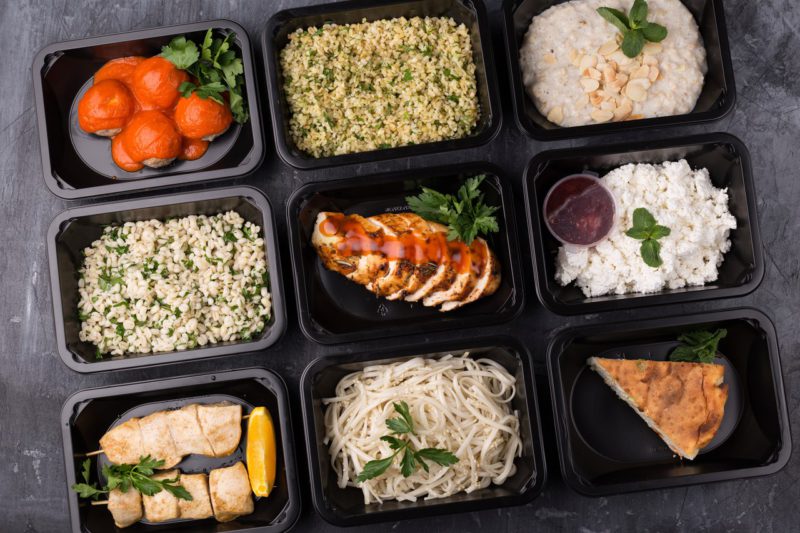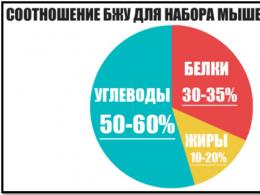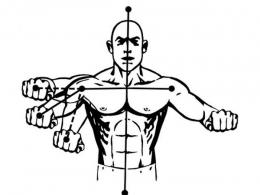How to calculate BZHU and why you need it: advice from Denis Gusev
Denis Gusev, master of sports in bodybuilding, winner of the Arnold Classic Europe in the Men’s Physique category and founder of the Level Kitchen service, explains how to correctly calculate calories and BJU in order to achieve any goal, and suggests the right formula for this.
Before calculating BJU, it is necessary to calculate the caloric content of the diet. Calorie is the amount of energy that the body receives as a result of the processing of food. Knowing the total number of calories affects the result of the efforts of a person who pursues a specific goal: lose weight, gain weight, keep fit. If a person needs to lose weight, he needs to reduce the calorie content of food, for example, by 300 or 500 calories, depending on weight. If a person's weight is very large, then by 1,000-1,500 calories.
After that, you need to calculate the ratio of BJU. All products consist of three main micronutrients - proteins, fats and carbohydrates (this is BJU). Let's look at an example. The girl wants to lose weight. She consumes 1,700 calories, respectively, we introduce a deficit of 300 kcal. Now the calorie content of her diet is 1,400 kcal, which must be divided into BJU:
- proteins should account for 40-50% of total calories;
- for carbohydrates - 30%;
- for fats - 20-25%.
If a girl is gaining weight, it is necessary to arrange a calorie surplus - "stay" by 1,700 kcal or add 100 calories. The body easily receives energy from carbohydrates and gains mass. Therefore, the ratio of BJU will be different:
- proteins - 30%;
- fats - 20-25%;
- carbohydrates - 50-60%.
If a person needs to maintain balance, but at the same time acquire relief, the BJU ratio will be as follows:
- proteins - 40%;
- fats - 20-25% (their amount never changes);
- carbohydrates - 40%.

- for women: BMR = 447.593 + (9.247 * weight in kg) + (3.098 * height in cm) - (4.330 * age in years);
- for men: BMR = 88.362 + (13.397 * weight in kg) + (4.799 * height in cm) - (5.677 * age in years).
It will help you understand how many calories you need to consume daily in order to lose weight or maintain weight. At the heart of this formula, as you noticed, are the following indicators: height, weight, age. Based on them, we get the basal metabolic rate, that is, how many calories a person spends at rest. Then the coefficient of human motor activity (AMR) is introduced, which is different for everyone. The resulting BMR must be multiplied by AMR:
- if you lead a sedentary lifestyle, multiply by 1.2;
- with moderate activity (light physical activity or classes 1-3 times a week) - by 1.375;
- average activity (classes 3-5 times a week) - 1.55;
- active lifestyle (intense exercise, classes 6-7 times a week) - 1,725;
- if you are an athlete or perform similar loads (6-7 times a week) - 1.9.

If a person wants to gain weight, you need to add 100-200 kcal to the resulting figure. If he is very thin, you can even 300-400. If you want to lose weight, you need to cut calories. The more a person weighs, the greater the calorie deficit he needs to create, that is, reduce calorie content by 100-1,500 kcal. Another factor to consider is the percentage of subcutaneous fat. It can be measured using a simple device - a caliperometer. If the fat is more than 20%, the calorie deficit may be 500 kcal; if more than 25%, then 700 kcal; if more than 30%, then 1,000 kcal.
Calculating all these parameters on your own is extremely difficult. For this, there are nutritionists who develop individual diets for their clients. Or services such as, where each dish strictly corresponds to the goals of the client in terms of calories and BJU ratio.

I believe that it is always necessary to adhere to BJU: it does not matter if you are losing weight or not. This proves both my personal experience and the experience of my clients. Although I have heard the opinion that theoretically it is possible to eat only fat-containing foods and still lose weight - the daily calorie intake will not be exceeded.
To stick to a diet for a long time, it should be clear, easy and not very calorie-restricted. If a person normally should consume 2,000 kcal per day, I suggest him a diet of 1,500 kcal, it will not be difficult to follow it. But if he is told to consume 1,200 kcal per day, in three weeks he will become ill. Hence the conclusion: if you need to go on a diet for a long time, you need to introduce a not too large calorie deficit. By the way, this is the approach I use when compiling diets for my service. Here is what the daily menu for mass gain looks like, calculated on 1,500 calories:
- for breakfast - oatmeal with a baked pear;
- lunch - buckwheat with herbs and turkey fillet stewed in its own juice with oregano;
- the second lunch - boiled penne (pasta) with herbs;
- snack - meatballs (meatballs) from veal in demi-glace sauce;
- dinner - squid fillet with ginger sauce.






